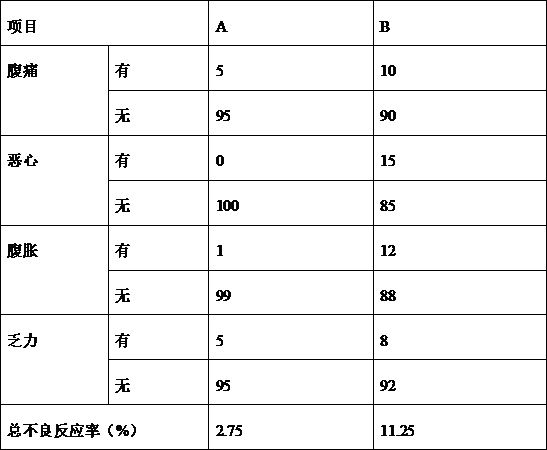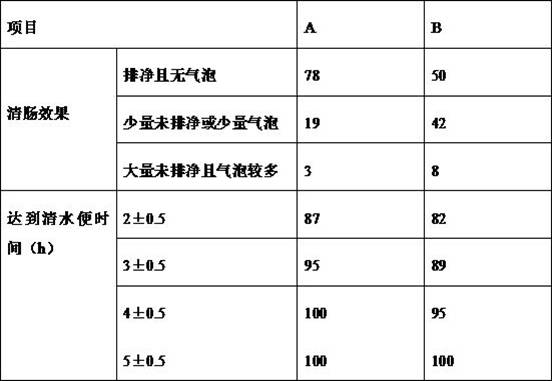Electrolyte powder containing polyethylene glycol and preparation method of electrolyte powder
A polyethylene glycol and electrolyte technology, applied in the field of medicine, can solve the problems of cumbersome manufacturing process, troublesome use by patients and high manufacturing cost, and achieve the effects of easy implementation, high production efficiency and low cost
- Summary
- Abstract
- Description
- Claims
- Application Information
AI Technical Summary
Problems solved by technology
Method used
Image
Examples
preparation example Construction
[0030] According to the method for preparing polyethylene glycol-containing electrolyte powder of the present invention, the method may further comprise the steps:
[0031] (1) Grinding, sieving, and drying polyethylene glycol, polylactic acid, inorganic salts and additives respectively; among them, the D97 particle size of polyethylene glycol after sieving is 160-200 μm, and the D97 particle size of polylactic acid The D97 particle size of inorganic salts is 120-160 μm, and the D97 particle size of additives is 80-120 μm; (2) Weigh the prescription amount of polyethylene glycol, polylactic acid, inorganic salts and additives , for standby; (3) Put the above-mentioned spare materials into a mixer and mix for 30-60 minutes, and take a sample to detect the content of intermediates; (4) Calculate the filling amount according to the intermediate content, divide it into packages, and seal it to get it.
[0032] According to the present invention, D97 refers to the corresponding par...
Embodiment 1
[0035]Take by weighing 75000g polyethylene glycol (4000), 15000g polylactic acid, 350g sodium chloride, 350g potassium chloride, 2000g gelatin, 200g cyclamate and 300g lemon essence, through pulverizing, sieving, make its D97 particle diameter reach requirement, After drying at 40°C for 1 h, it was ready for use. Put the above spare materials in a mixer and mix for 30 minutes, then take a sample to test the content of the intermediates. After passing the test, calculate the filling amount according to the intermediate content, divide them into plastic bottles with scales, add stoppers, and press the caps to seal. Among them, each bag contains polyethylene glycol (4000) 75g, polylactic acid 15g, sodium chloride 0.35g, potassium chloride 0.35g, gelatin 2g, cyclamate 0.2g and lemon essence 0.3g.
Embodiment 2
[0037] Weigh 75000g polyethylene glycol (4000), 10000g polylactic acid, 350g sodium chloride, 350g potassium chloride, 200g sodium bicarbonate, 3000g gelatin, 300g saccharin sodium and 300g lemon essence, crush and sieve to make it D97 When the particle size reaches the requirement, dry it at 50°C for 1 hour, and then use it for later use. Put the above spare materials in the mixer and mix them for 40 minutes, then take a sample to test the content of the intermediates. After passing the test, calculate the filling amount according to the intermediate content, divide them into plastic bottles with scales, add stoppers, and press the caps to seal. Among them, each bag contains 75g of polyethylene glycol (4000), 10g of polylactic acid, 0.35g of sodium chloride, 0.35g of potassium chloride, 0.2g of sodium bicarbonate, 3g of gelatin, 0.3g of sodium saccharin and 0.3g of lemon essence.
PUM
| Property | Measurement | Unit |
|---|---|---|
| particle diameter | aaaaa | aaaaa |
| particle diameter | aaaaa | aaaaa |
| particle diameter | aaaaa | aaaaa |
Abstract
Description
Claims
Application Information
 Login to View More
Login to View More - R&D
- Intellectual Property
- Life Sciences
- Materials
- Tech Scout
- Unparalleled Data Quality
- Higher Quality Content
- 60% Fewer Hallucinations
Browse by: Latest US Patents, China's latest patents, Technical Efficacy Thesaurus, Application Domain, Technology Topic, Popular Technical Reports.
© 2025 PatSnap. All rights reserved.Legal|Privacy policy|Modern Slavery Act Transparency Statement|Sitemap|About US| Contact US: help@patsnap.com


